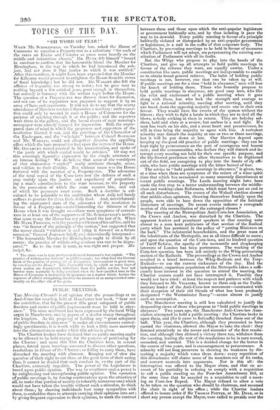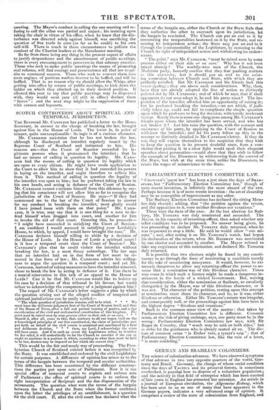PUBLIC MEETINGS.
THE Morning Chronicle is of opinion that the proceedings at an Anti-Corn-law meeting, held at Manchester last week, "bear out the conviction, that for the present this great safeguard of public freedom and means of public improvement must be held in abey- ance." The same sentiment has been expressed by the local Whig organ in Manchester, and by papers of a similar stamp throughout the kingdom. As the propr:ety of holding any "great safeguard of public freedom in abeyance" is under all circumstances exceed- ingly questionable, it is worth while to look a little more narrowly into the circumstances under which this advice is given.
The Chartist leaders have declared that no public meeting ought to be allowed to be held except for the purrose of petitioning for the Charter : and upon this hint the Chartists have, in several places, forced upon meetings convened to discuss other questions, resolutions in favour of the Charter ; or failing to carry these, have disturbed the meeting with clamour. Keeping out of view the question of their right to act thus, or the good taste of their acting thus, it cannot be denied that such conduct is, on the part of the Chartists, extremely impolitic. The power of the Legislature is based upon public opinion. The way to overthrow such a power is by enlightening and strengthening public opinion. The operation of public meetings is, by forcing controversies upon the attention of all, to make that portion of society (a tolerably numerous one) which would not have taken the trouble without such a stimulus, to think about them ; by showing individuals how many sympathize with them, to embolden them to attempt carrying their opinions into act ; by giving frequent expression to their opinions, to mark the contrast
between them and those upon which the anti-popular legislature or government habitually acts, and by thus isolating it pave the way to its downfal. Every public meeting in favour ofa principle habitually violated or disregarded by an anti-popular government or legislature, is a nail in the coffin of that corporate body. The Chartists, by preventing meetings to be held in favour of measures which Parliament will npt adopt, are perpetuating the existing con- stitution of Parliament with all its faults.
But the Whigs who propose to play into the hands of the Chartists, and give up all attempts to hold public meetings in favour of the reforms they want, are equally unwise. Under a constitution like ours, public meetings are indispensable to enable us to obtain broad general reforms. The habit of holding public meetings is not, however, one that can be taken up at will. If public meetings are for a time "held in abeyance," men will lose the knack of holding them. Those who honestly propose to hold public meetings in abeyance, are good easy men, who like the eclat and excitement of a public meeting when it goes along with them, but who lack the strength and courage to fight in a rational minority, meeting after meeting, until they can break down the opposing majority and create one in their own favour. They would have the sweets of the system without the bitters; they wish to fight a battle in which they are to deal all the blows, nobody striking at them in return. They are holy day sol- diers, bold and elate at a review, but useless in a real fight. If a man has truth on his side, and a stout heart and perseverance, he will in time bring the majority to agree with him. A turbulent minority may disturb the majority at one or two or three meetings, but it will be put down at last. Our liberties depend upon keeping up the good old practice of public meetings: they can be kept right by perseverance on the part of courageous and honest men; and the unreasonables, who declare they will disturb and in- terrupt every meeting not held for their one specific purpose, and the lily-livered gentlemen who allow themselves to be frightened out of the field, are conspiring to play into the hands of sly offi- cials, who hate public meetings with the bitter hatred of fear.
The advice to "hold public meetings in abeyance," is given, too, at a time when there are symptoms of the return of a wiser spirit than that which has occasioned so many unseemly disturbances at recent public meetings. The Leeds meeting might haVe been made the first step to a better understanding between the middle- class and working-class Reformers, which must have put an end to all such disturbances. The events of the Walsall election showed that middle-class agitators, throwing themselves frankly upon the people, were able to bear down the opposition of the habitual disturbers of meetings. Do recent events indicate a retrograde motion of this reconciliation of the estranged classes ?
The meeting of the Metropolitan Anti-Corn-law Association, at the Crown and Anchor, was disturbed by the Chartists. The apparent leaders and prominent speakers at that meeting were almost to a man keen politicians of that section of the Radical party which has persisted in the policy of "patting Ministers on the back." The substantial householders, and the great mass of the inhabitants of the Metropolis, are at all times difficult to move; and upon the question of the Corn-laws, and its kindred question of Tariff Reform, the apathy of the mercantile and shopkeeping interests of London has been portentous. The working of the Corn-law question has been left entirely to the Whig-patronizing section of the Radicals. The proceedings at the Crown and Anchor resulted in a brawl between the Whig-Radicals and the Tory- Radicals—to use the current nicknames of the day. Had the independent, unpartisan population of the Metropolis taken a suffi- ciently keen interest in the question to attend the meeting, the Chartist orators could not have interrupted it. Possibly they would not have tried : at least the respect and patience with which they listened to Mr. VILLIERS, known to them only as the Parlia- mentary leader of the Anti-Corn-law movement—contrasted with their reception of their old friends of what has been profanely designated " the Westminster Rump"—seems almost to justify such an assumption. .
The Manchester meeting is still less calculated to justify the desponding views of those who propose to "hold public meetings in abeyance.' Two years ago, the Manchester Anti-Corn-law Asso- ciation attempted to hols public meeting : the Chartists broke in upon them, and (for it came to fisticuffs) thrashed them out of the hall. This year, the Chartists, although they pretended to have carried the chairman, allowed the Mayor to take the chair : they listened attentively to the mover and seconder of the first resolu- tion, and although they claimed a victory there too, withdrew from the meeting, leaving the rest of the resolutions to be in turn moved, seconded, and carried. This is a decided change for the better in the course of two years, and is encouragement to perseverance. A minority will not long persevere in showing its weakness by dis- turbing a majority which votes them down : every repetition of this disturbance will shame some of its members out of its ranks, and convert neutrals into opponents. Nor is this all: the interruption was offered to the Mayor alone, and that on ac- count of his partiality in refusing to comply with a requisition to call a public meeting on the Poor-law Amendment Bill, at the same time that he acceded to a requisition to call a meet- ing on Corn-law Repeal. The Mayor refused to allow a vote to be taken on the question who should be chairman, and assumed the chair in right of his office ; while the Chartist leaders offered to insure order if Sir THOMAS POTTER, or Mr. DYER, or in short any person except the Mayor, were called to preside over the
meeting. The Mayor's conduct in calling the one meeting and re- fusing to call the other was partial and unjust ; his insisting upon taking the chair in virtue of his office, when he knew that the dis- turbance was directed solely against himself, was sacrificing the question of free trade in corn (as far as he could) to his own self-will. There is much in these circumstances to palliate the conduct of the Chartist leaders at the Manchester meeting.
So far from there being any thing in the present aspect of affairs to justify despondence and the abandonment of public meetings, there is every encouragement to persevere in that salutary practice. Those who seek to make public meetings the means of promoting real reforms, will find courage and perseverance all that are requi- site to command success. Those who seek to convert them into mere engines of partisan warfare deserve to be baffled, and will be baffled. That is no reason why we should allow the Whigs, after getting into office by means of public meetings, to kick down the ladder on which they climbed up to their desired position. If allowed this year to say that public meetings may be dispensed with, they would next year (if still in office) declare them " farces" ; and the next step might be the suppression of them with cannon and bayonets.



























 Previous page
Previous page